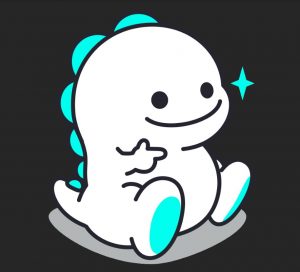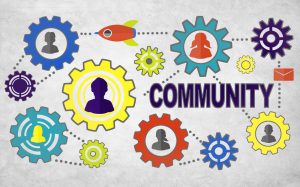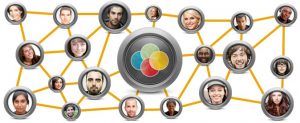Sources: Wikia, Business Wire.
Introduction
Society expresses itself in collective groups, which allow for individuals to interact with each other, develop relationships, share experiences and thus create meaning. This is the realisation of communities.
Nonetheless, an online community acts as a two-edged sword. It is an umbrella for healthy communication, and a platform which invades privacy (Preece 2001: 8). This society consists of individuals who share the job of producers, consumers and prosumers. It is a space of fantasy where terms and conditions (values and norms) of ‘real life’ become secondary.
I shall be writing on the theme of Online Community in close relationship with the Social Media site, BIGO Live. I aim to shed light on what it means to be part of an online community, how it is formulated, and the identity and collective meaning which shape the experiences of its users.
Before I get Old: What it means to be part of an Online Community
Source: Standing on Giants
The online community flaunts a young and vibrant group of individuals who feel the need to depict their lives as exciting, to appear young, trendy and ‘cool’. The modernist perspective perceives the other as something or someone who reflects a different perspective from the viewer (Young 1999: 5). Just as the name; Before I Get Old (BIGO) implies, an online community is constituted of individuals who assemble under the banner of youthfulness, and use it as a medium of sharing experiences and developing relationships. To be young is to abstain from things which ‘old’ people would do, such as living life with caution and being fully aware of the consequences of their actions. BIGO, as an online community promotes the ideas of living life to the fullest and being obsessed with yourself.
BIGO Live invites individuals into the lifestyle of narcissism, with the promise of fame in return (BIGO Technology PTE LTD 2017). The online community entails the commodification of communication. The practise of inviting individuals to partake of the ‘glorious’ act, which is human interaction, in return for a youthful and vibrant life online. Ferreday (in Karatzogianni and Kuntsman 2012: 80) claims that, ‘the digital has become a site of struggle over what constitutes reality’. The online community acts as a sweet escape from the troubles of the real world. An unrealistic virtual space where desires and fantasies are performed.
How is an Online Community formulated?
Online communities are created because of togetherness felt by a group of individuals, due to the mutuality of their beliefs and interests. Ritzer (2007: 36 – 40) discusses the ‘Something-Nothing Continuum’. He argues that, the social world is comprised of the combination of ‘nothing’ and ‘something’. He furthermore defines something as a social practise that is generally produced, controlled and somewhat rich in distinctive significant content. He describes nothing as somewhat lacking in content. Ferreday (2011: 25) describes community as ‘a process’.
Online communities undergo a procedure, which features the production of content that reflects significant meaning, and others that do not. It goes back and forth, and shapes our overall understanding of this community, as a digital reflection of the social world.
Everything that happens within this space usually expresses the singular concept; Something-Nothing Continuum. Within BIGO live, certain users within this online community use this platform as a stage for the expression of matters, which they find meaningful within society, such as postmodern political occurrences and the straining placed on the public as an aftermath of them. This performance of ‘something’ formulates this online community as an educational sphere, which allows for meaningful and positive interaction on things that matter, within a global scale. Nevertheless, online communities are mostly comprised of nothing; issues and topics which stem from matters of negative and less meaningful subjects. This aspect of the online community features the phase of self-realisation; the realisation that, we as individuals derive pleasure from subversive and socially unacceptable themes such as pornography. The sensual drive that accompanies the human flesh may have located its daring partner, digital technology (Nguyen and Alexander in Shields 1996: 117). This leads us to the discovery of the chaotic identity, which characterises the nature of online communities, and the experiences faced by its participants.
Identity and Meaning in Online Communities
Source: Brand Networks
The coming of online communities has endorsed the expression of selves. These include selves that:
- We do not want to be
- We Pretend to be
- Society expects us to be
- We desire to be (Ideal selves)
Miller (2011: 161) highlights that ‘identities are not unified, solid or stable, but maintained, changeable and often contradictory’. The combination of multiple selves, give birth to complex or chaotic identities which are exhibited within several online communities, including BIGO Live.
Whenever I log into this site, I experience a struggle in picking the most suitable identity to express in given situations. I tend to be a different self to a single individual, compared to who I am during live sessions with thousands of viewers from across the globe. Whilst speaking to them, I express my most ideal self. During one-on-one live sessions, I put on a false self, the one I pretend to be. It should therefore the noted that, online spaces of communication are made up of invented identities (Kirby 2009: 106).
The introduction of these virtual communities has in more ways than one, affected our lives. It creates and strengthens relationships of work and social life. Business owners and individuals with talents to show the world, use these communities to showcase and sell their services and products to those who can relate it to their lives, while on the other hand creating a blur where there seems to be no difference between work and play life. This creates the illusion of an ‘authentic life’ (Harris 2004: 127 – 128). ‘The authentic self’ portrays a life of freedom online, to embody any and everything I desire.
Conclusion

The expression of the individual is an unavoidable element within society. Online communities have propagated ‘the sharing of common meanings, and thence common activities and purposes; the offering, reception and comparison of new meanings’ (Williams 1961: 10).
I have used BIGO Live as an ideal online community, which allows for users to construct identities as they wish. This platform acts as a mouldable medium, which commits itself into the hands of its consumers, and allows for us to use it as we please. It also invites individuals to express fantasies and desires, and forget about reality for a moment.

Bibliography
BIGO Technology PTE LTD (2017) BIGO Live Broadcasting [online] available from <https://play.google.com/store/apps/details?id=sg.bigo.live&hl=en_GB> [14th March 2017]
Ferreday, D (2011) Online Belongings: Fantasy, Affect and Web Communities. Peter Lang: Oxford.
Harris, A. (2004) Next Wave Cultures: Feminism, Subcultures, Activism. Routledge: New York.
Karatzogianni, A., Kuntsman, A. (2012) Digital Cultures and the Politics of Emotion: Feelings, Affect and Technological Change. PALGRAVE MACMILLAN: Basingstoke.
Kirby, A. (2009) Digimodernism: How New Technologies Dismantle the Postmodern and Reconfigure Our Culture. The Continuum International Publishing Group Inc: New York.
Miller, V. (2011) Understanding Digital Culture. SAGE Publications: London.
Preece, J. (2000) Online Communities: Designing Usability, Supporting Sociability. John Wiley & Sons, Ltd: Chichester.
Ritzer, G. (2007) The Globalization of Nothing 2. Pine Forge Press: California.
Sheilds, R. (1996) Cultures of Internet: Virtual Spaces, Real Histories, Living Bodies. SAGE Publications: London.
Young, J. (1999) The Exclusive Society: Social Exclusion, Crime and Difference in Late Modernity. SAGE Publications Limited: London.
Williams, R. (1961) The Long Revolution. Broad View Press: Toronto.





Recent Comments